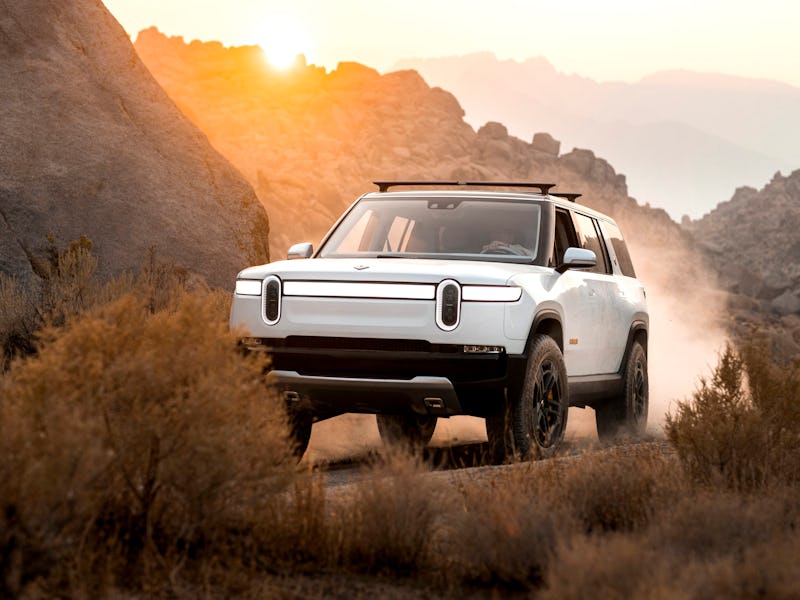Rivian’s next electric cars could follow a Tesla-like path to success
Rivian plans to launch the R1T and R1S soon, but it's already looking further ahead.

Rivian is yet to release its first electric car, but the company already has plans for its fourth vehicle and beyond.
In a report published in Reuters on Wednesday, Rivian CEO R.J. Scaringe said the Michigan-headquartered firm will produce a series of "follow-on products" to its first cars.
Rivian aims to start delivering the R1T truck in June 2021 and the R1S SUV in August 2021. After initial roll-out, the company plans to ship the SUV to Europe and China, starting with Europe in 2022, but their successors "will really drive volume in those markets," according to the report.
Scaringe revealed little further details about these new vehicles in the report. But here is what we do know: They will be smaller vehicles — the R1T measures 72 inches high by 218 inches long by 79 inches wide. They will also use components found in their predecessors. Scaringe told Reuters that these smaller models will "fit some of those other markets really well, in particular China."
Rivian declined Inverse's request for comment on the new vehicles.
The move bears similarities to other car companies. Tesla, the the world's most valuable automaker, is expected to launch its Cybertruck in late 2021. But CEO Elon Musk said in May that the company plans to release a "smaller, tight world truck at some point." The truck's measurements, as provided at the November 2019 launch, showed it measured 79.8 inches wide, 75 inches tall and 231.7 inches long.
The trend in modifying fleets to fit the market is common across the automotive industry. In a story published in March, the New York Times noted that some cars in the 2020 Geneva International Motor Show, like the Seat Leon, won't make their way stateside. Factors like cheaper gas, lower vehicle taxes, and more distance to cover mean American tastes lean more toward bigger vehicles. An oversaturated market means some brands don't even bother trying to go transatlantic.
Stephanie Brinley, principal analyst for IHS Markit, told theTimes at the time that Americans "plan for the most extreme-use case, while Europeans are more comfortable squeezing things into a small space."
In China, the world's biggest car market, the market is more complex. A McKinsey report on China's market in 2019 found that SUVs are the most popular vehicle among consumers. The report said analysts would expect "vehicle sizes most suited to daily use to dominate."
A Deloitte white paper found in 2019 that in China's new energy vehicle segment domestic auto brands are likely to focus on longer-range sedans and SUVs while improving the range on entry-level vehicles.
Could Rivian follow a Tesla-like strategy for competing in China?
Another way Rivian might follow Tesla's path into these markets is in manufacturing, Scaringe suggested in the Reuters report. Tesla opened a "gigafactory" in Shanghai that makes entry-level sedans and compact SUVs for the local market. Similar plans are underway for a factory in Berlin.
“To really scale in those markets as we bring on follow-on products, having a production footprint outside the U.S. is going to be important,” Scaringe told Reuters. “That’s a ways off.”
For now, the company seems most focused on its R1T and R1S. An entry-level $67,500 version of the R1T and $70,000 version of the R1S are both expected to launch in January 2022. The company also announced they will create an electric delivery van for Amazon.
The Inverse analysis — Rivian is aiming big, but there is a key difference between the company's plans and Tesla's first forays.
Rivian's starting lineup seems geared to tempting a consumer who loves to explore the outdoors. Model names like "Explore Edition," a focus on the cars' wading depth, and reported plans to roll out charging points near national parks, all add to this branding.
But much like Tesla, Rivian also has ideas about how to keep buyers coming in after initial releases. Tesla started off with a high-end supercar and moved further out with cheaper and more mainstream vehicles, and Rivian could try to do similar within its own niche. But regardless of how far Rivian emulates its competitor, Tesla, this new report suggests the electric car market has an interesting few years ahead.
This article was originally published on